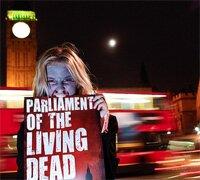Irrational beliefs are useful too
In a comment here, Matthew suggests that support for freedom is enhanced by egoism, in the sense of people’s exaggerated faith in their own ability to control their lives.
This is a plausible claim. It’s a cliché that opposition to redistribution in the US is based partly upon the belief of the poor that they can get rich*.
But this just shows that irrational beliefs can serve useful functions. Few people would embark upon risky ventures such as starting their own business, developing new products, or writing books unless they were irrationally over-confident of their chances of success.
And religious belief is correlated with greater happiness, more law-abiding behaviour and support (pdf) for markets.
This implies that there is a potential conflict between two forms of rationality:
1. Belief rationality, which says our beliefs should be proportioned to the evidence. This tells us not to believe in God, and that the odds of being a successful innovator are small.
2. Instrumental rationality, which says we should act so as to maximize our chosen ends.
In some cases, though, desirable goals – wealth, happiness, liberty in Matthew’s example – can be pursued best by abandoning belief rationality.
In this context, atheists such as Richard Dawkins can speak at cross-purposes with believers. When Dawkins says: “believe in evolution, not God”, he’s advocating belief rationality. When his interlocuters reply: “but my community believes in God” they are (implicitly) advancing a form of instrumental rationality; they think they would lose good things when they lose their faith.
The issue here isn’t – or at least isn’t always – one of rationality versus irrationality. It’s: which rationality?
* Irrationality isn’t always the servant of freedom, however. One source of support for repressive measures such as ID cards or 42 days detention is people’s bias to look upon the bright side, and believe that bad things – identity theft or arbitrary imprisonment – only happen to other people. This optimism bias might explain why there’s often more opposition to redistributive taxation than to restrictions upon civil liberties.
-------------------------
| Tweet |
Chris Dillow is a regular contributor and former City economist, now an economics writer. He is also the author of The End of Politics: New Labour and the Folly of Managerialism. Also at: Stumbling and Mumbling
· Other posts by Chris Dillow
Filed under
Blog ,Civil liberties ,Religion
7 responses in total ||
Obviously irrational beliefs can be useful. Voting, for example, would break down entirely if people didn’t believe that their vote could make a difference, when in fact the chance of that happening is almost zero (especially since if an election really did come down to a single vote, there would probably have to be a re-run election.) Voting is completely irrational on an individual level but it works fine as a way of running a society.
Religion, however, is a very difficult case, and whether religion is “good for you” is an open question. There are a lot of studies finding better health outcomes in more religious people but the effects are usually pretty small and it’s unclear whether it’s belief, per se, which is beneficial, vs. being part of a supportive community. There are also differences between religions e.g. I seem to remember that Catholicism is better than Protestantism on some measures e.g. reducing suicide rates.
Overall I’m sceptical of any attempts to say that religion is beneficial or harmful overall, since the positive and negative aspects are hard to measure and even harder to weigh against each other. The fact that almost everyone who thinks religion is harmful is a hardcore atheist and most people who think it’s great are very religious themselves, makes me think the whole argument is just a political echo of the debate over whether God exists.
I am not sure that the term “instrumental rationality” is necessarily a good one for – a set of beliefs, not necessarily true, that will help you get through your day – but let us suppose we use it.
Surely the interesting thing is not so much that these “rationalities” conflict but that they lie on top of one another. We are capable of holding in our heads any number of overlapping and contradictory “truths” and, as human beings, we are expert at picking out the one that best meets our current requirements.
Nor does this make us silly irrational beings – for example, if you ask someone to describe how objects inter-react with one another, the description you will get is generally Newtonian in character, even if that person knows perfectly well that, under certain circumstances, the inter-reaction is relativistic in character or, indeed quantum. In almost all circumstances, the Newtonian answer is the simplest answer that gives a reasonable approximation of truth – but we carry the others around just in case.
Similarly, we are quite capable of carrying around an instrumental belief system (the business I have just set up will do fantastically well – the book I am writing will win awards) even though we are also capable of doing the complex calculations which tell us about our real chances of success. In the case of the business, this does not matter so much – the actions that are likely to make our business successful in a rational analysis are likely to be the same actions that will make it successful in the instrumental belief system. We can therefore choose to spend most of our time in the more comfortable surroundings of the belief system because it is, frankly, a less stressful place to be. The belief that we will be successful carries few penalties – so why not?
We don’t need to strip away all these belief systems (or delusions as Dawkins insists on calling them) we simply need to be as sophisticated about how we shuttle between truth and belief or belief rationality and instrumental rationality if you prefer.
For example, I do not believe myself to be a racist. However, a rigorous test of this proposition conducted by walking around South London’s Heygate Estate late at night might conceivably reveal that, contrary to what I think I think, I am indeed more wary of black people than white people under stressful circumstances. Should that affect the general contention that I do not consider myself to be a racist? Well, a bit, certainly but perhaps I am simply reacting rationally to the evidence presented to me by newspapers (who may or may not be racists themselves). What it should certainly prompt me to do is to ensure that, if I am in a situation, such as a job interview, where there is a possibility of the general, everyday belief that I am not a racist blinding me to an unconscious act of racism then I should make certain that I am using all my objectivity (my belief rationalism) to check the decisions I am making.
It is only by shuttling between the comforting general belief and the occasionally uncomfortable process of attempting to think objectively that the validity of the general belief can be maintained – even despite the awareness that I may harbour unconscious prejudices.
I’m a great believer in irrationality as part of the human condition. As to the specifics of the article surely it depends on the people in question. For some people to be free is to have the freedom to be irrational; some find more freedom in having their lives structured in some way by state or church.
Freedom itself is such a subjective concept that it is hard to say one way or the other. Control matters but some people simply dont want too much control and thats all well and good. In terms of framing specific policy the way forward surely is to find a way for the two things to co-exist.
“Voting is completely irrational on an individual level but it works fine as a way of running a society.”
That is certainly an open question: http://www.cato.org/pub_display.php?pub_id=8262
Most people would settle on “least worst” rather than fine. I would argue that it would be best to limit so far as possible the scope with which voting mechanisms impact on individual decisions, and that state governments tend to behave better when citizens have an enforceable right of exit of their jurisdiction besides a right to vote.
Your use of “instrumental rationality” here is highly misleading.
The religious believer doesn’t see belief as a matter of “maximizing” anything; rather, the doctrines she believes in and the practices she undertakes are part of what makes her life within the community she belongs to meaningful. Similarly, Dawkins no doubt sees free scientific enquiry as a vital ingredient of the life of a scientist. The loss of the ability to engage in it (e.g. through the imposition of a theocracy) wouldn’t be the loss of an instrumental good, but would be the loss of everything that makes the life of a scientist mean anything at all.
I think Dawkins should dally with religion a little longer and he’ll probably find accomodation with one form or another.
This article is flawed by presenting an explanation for unqualified personal bias when the qualification would have rendered it redundant before it had started.
People have… “faith in their own ability to control their lives” infers an absolute position, which could be more accurately rendered “faith in their own ability to control the direction of their lives”. Then we’d have less cause to be criticised for exaggeration.
Reactions: Twitter, blogs
-
» The issue [...] isn’t - or at least is … Talk Islam
[...] }); Tags: beliefs, irrationality, rationality, tradition The issue [...] isn’t – or at least isn’t always – one of rationality versus irrationality. It??… [...]
Sorry, the comment form is closed at this time.
You can read articles through the front page, via Twitter or RSS feed.
» Why Labour was right to reject Bob’s drug policy
» Ten myths about housing benefit reforms in London
» What if Superdrug lived up to its name?
» Why we want to ‘recall’ Aaron Porter as NUS President
» Breakthrough in drugs debate as MPs call for full decriminalisation
» Report shows how the promise on NHS spending has been broken
» Why climate talks in Cancun failed miserably
» Why cuts to local councils will be much worse than Tories suggest
» Left unity and the bid to oust Aaron Porter
» The true horror of NHS privatisation is slowly coming out
» Why these protests are more dangerous than politicians realise
|
14 Comments 13 Comments 4 Comments 15 Comments 45 Comments 39 Comments 34 Comments 19 Comments 33 Comments 34 Comments |
LATEST COMMENTS » Richard posted on John Pilger shames himself by attacking feminists over Julian Assange » Watchman posted on What if Superdrug lived up to its name? » Richard posted on 49 universities are or were under occupation » soru posted on What if Superdrug lived up to its name? » Chukker Norris posted on 49 universities are or were under occupation » L K Spindley posted on Ten myths about housing benefit reforms in London » TenPercent posted on John Pilger shames himself by attacking feminists over Julian Assange » Andy H posted on 49 universities are or were under occupation » Luis Enrique posted on Why Labour was right to reject Bob's drug policy » Watchman posted on John Pilger shames himself by attacking feminists over Julian Assange » the a&e charge nurse posted on John Pilger shames himself by attacking feminists over Julian Assange » Jackart posted on 49 universities are or were under occupation » Dave posted on Why Labour was right to reject Bob's drug policy » Dave posted on Why Labour was right to reject Bob's drug policy » Lee Griffin posted on Labour voters switch to supporting AV in new poll |















